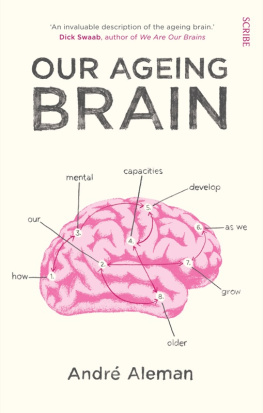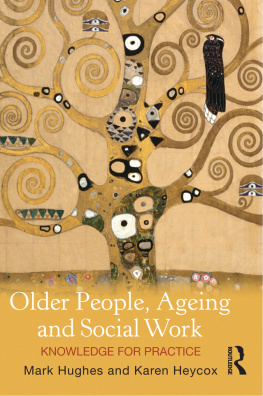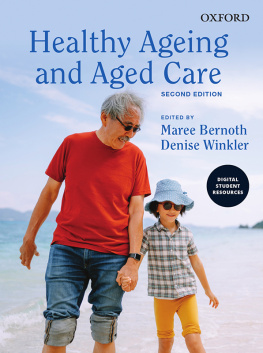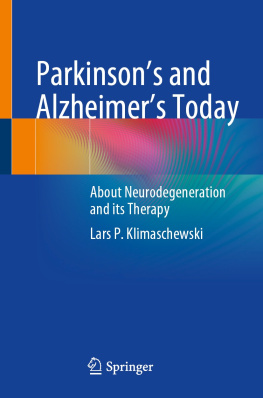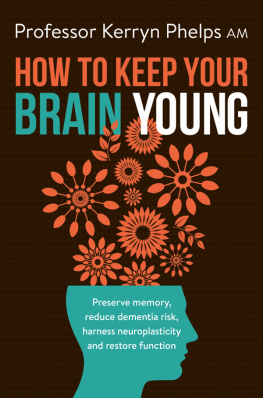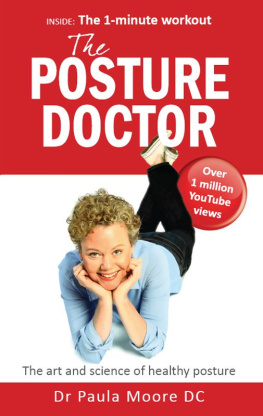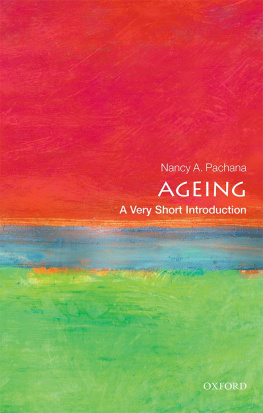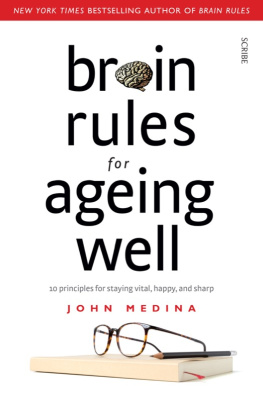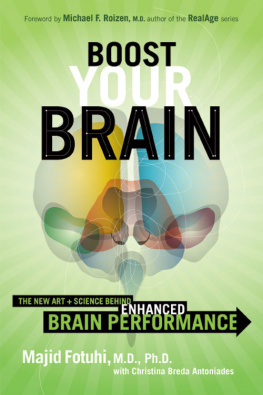
Scribe Publications
OUR AGEING BRAIN
ANDR ALEMAN is professor of cognitive neuro- psychology at the University of Groningen. An internationally respected neuroscientist, he has received international awards and scholarships for his work. In 2011, he published the highly successful Figments of Our Imagination: why we see, hear, and think things that arent there (published in Dutch).
ANNETTE MILLS was born in the UK. After graduating from Kings College, London University, she lived for several years in North Africa and the Middle East, finally settling in the Netherlands in 1978. She has worked as a translator since 1981, both at the Dutch Ministry of Foreign Affairs and as a freelancer.
Scribe Publications Pty Ltd
1820 Edward St, Brunswick, Victoria 3056, Australia
2 John St, Clerkenwell, London, WC1N 2ES, United Kingdom
First published in Dutch as Het Seniorenbrein by Uitgeverij Atlas Contact, Amsterdam, 2012
Published by Scribe 2014
Copyright Andr Aleman 2012
English translation copyright Annette Mills 2014
All rights reserved. Without limiting the rights under copyright reserved above, no part of this publication may be reproduced, stored in or introduced into a retrieval system, or transmitted, in any form or by any means (electronic, mechanical, photocopying, recording or otherwise) without the prior written permission of the publishers of this book.
National Library of Australia
Cataloguing-in-Publication data
Aleman, Andr, author.
Our Ageing Brain: how our mental capacities develop as we grow older / Andr Aleman; Annette Mills (translator).
9781925106114 (Australian edition)
9781922247636 (UK edition)
9781925113259 (e-book)
1. Age and intelligence. 2. Ability, Influence of age on. 3. Human information processingAge factors. 4. Cognition in old age. 5. AgingPsychological aspects.
Other Authors/Contributors: Mills, Annette, translator.
155.67
scribepublications.com.au
scribepublications.co.uk
CONTENTS
1 :
how our mental capacities change
Preconceptions
A sublime pianist
Verbal and visual memory
Working memory
Flexible thinking
Speed of information processing
Reserves
2 :
why older people are more emotionally stable
Personality changes
Living in the here and now
The importance of emotions
Ageing brains and emotions
Dark moments in later life
Social relationships
3 :
the anatomy of the ageing brain
Changes at cell level
A brain aged
Changes in the brain that accompany ageing
Reduced growth in brain cells
The PASA pattern
A tidy brain
4 :
where is the line between the two, and what can you do about it?
A diagnosis of MCI
Changes in the brain associated with MCI
From MCI to Alzheimers
What can you do about MCI?
If dementia does strike
5 :
the influence of hormones
Hormonal changes
Oestrogens and menopausal symptoms
Testosterone and cognitive functions
A mysterious hormone
6 :
what works (and what doesnt)
Pills
Natural supplements
Cognitive training
Physical exercise
7 :
why older people are wiser
What is wisdom?
How older people reason
The older, the wiser?
The tortoise and the hare
The experienced decision-maker
Make haste slowly
8 :
scientifically proven advice
Successful ageing
Choose your parents carefully
Know what you eat
Keep active
Spirituality, the art of living, and mindfulness
A five-point plan
Introduction
In 2012, at the age of 102, Theodora Claassen-Roos told the newspaper NRC Handelsblad that for the last few years, the mayor had paid her a visit on her birthday. But she had told her children (the oldest is 77; the youngest, 64) that she really didnt need to celebrate her birthday anymore. Far too expensive to do that every year, she said. Its just a waste of money.
Theodora has always led a healthy life. I go for a little walk every day. It keeps me active. I always meet people I know and we have a chat, she explained. But apart from that, I dont know what Ive done to live so long. She reads two newspapers each day, and has a particular interest in the articles about science. But I dont spend the whole day reading, you know. That would be a real waste of time!
Why is one person still fit and healthy at the age of 100, while another might have serious memory problems in their sixties? Is everyone at risk of Alzheimers? What does the brain of an 80-year-old look like? And are there any advantages to having an older brain? In this book, I try to answer these questions on the basis of the latest scientific findings.
Since university, I have been fascinated by ageing processes in the brain. My final paper at the University Medical Centre Utrecht was on the link between growth hormone and cognitive skills in older men, and my article on the subject was published in The Journal of Clinical Endocrinology and Metabolism . In the years that followed, I was involved in a range of studies of brain function in ageing subjects. Now, in Our Ageing Brain , I report on these studies and on all kinds of research performed by colleagues in this field. My current employer, the University Medical Centre Groningen, focuses on research into healthy ageing. There, in 2012, I started on a new study into brain function in older people who suffer from forgetfulness but have not been diagnosed with dementia, since they are still capable of leading an independent life.
In this book, I often refer to older people or seniors. By that, I mean people over the age of 65, a dividing line frequently adopted in medical research. It is sometimes called the third age, following on from the first age (youth to early twenties) and the second age (middle age). So Im using what has long been seen as the retirement age as a marker. In fact, theres also a solid argument for regarding 70 as the beginning of old age, since people currently live longer than they did 50 years ago and stay fit for longer. But this book is not just for those over 65. I have written it for everyone who wants to know what research has actually established about the brain and ageing.
In 2012, there were 3.22 million people over 65 in Australia, comprising 14 per cent of the total population. According to the Australian Bureau of Statistics, this figure is predicted to rise to between 23 and 25 per cent of the population by 2056. Since 2010, the group known as baby boomers (people born in the post-war baby boom between 1946 and 1964) have started to reach retirement age. And they are living longer: the life expectancy of Australians continues to grow. In 2012, the average 65-year-old woman could expect to live to the age of 87 (or 1.2 years more than in 2002); and the average 65-year-old man, to the age of 82 (or 1.7 years more than in 2002). Thus, the population is greying rapidly. And the central focus of this book is what happens to our grey cells in that process.
As we age, our brain cells undergo an irreversible decline. Some brain cells shrink, connections between different areas of the brain disappear, memory and concentration erode, and other cognitive abilities slow down. But its not all bad news. Older people are often happier than their younger counterparts. They cope better with emotions and stress, and are better at making complex decisions. There are, of course, huge differences between people in this age group, and I try to explain why this is so. On the basis of the latest research findings, Ill show you what changes occur in the brain and how older people use other areas of the brain to compensate for decline. Ill also take a look at the enormous variety of pills, powders, and supplements that promise to reverse the process but actually deliver very little. And Ill tell you what you can do that does help. Finally, Ill deal with the intriguing question of how we become wiser thanks to decline, and what successful ageing a term that has even made it into the scientific literature really is.
Next page
